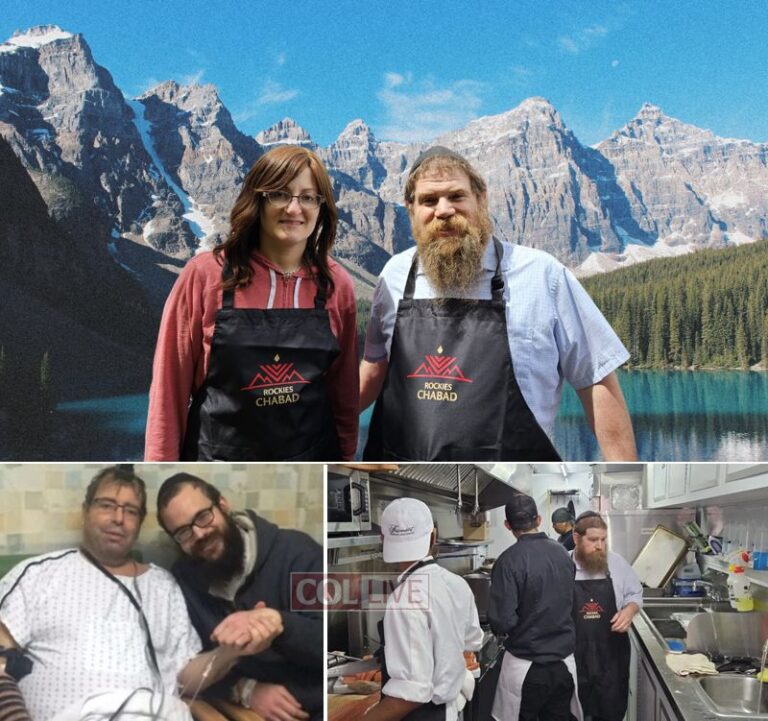Prayer, a kidney donation and a boy's memory spark kosher in Canada's Rocky Mountains. Read full article
By Uziel Shiner – Chabad.org
Banff, Alberta, Canada, has a kosher kitchen. The $200,000 project brings the first fully-fledged commercial kosher kitchen to one of North America's premier resort towns and tourist destinations — and it's all on wheels!
After serving the Jewish community in Edmonton, Alberta for 20 years, Rabbi David Pinsonhis wife Deborah They and their five children moved to the Banff region last fall and opened Chabad Lubavitch of the Canadian Rockies. Banff features stately, snow-capped mountains set against an idyllic landscape of stunning slopes, hiking trails, parks, crystal clear rivers and steaming hot springs, making it a popular tourist destination that draws about 5 million visitors each year.
From the beginning, one of the Pinsons' priorities was to make kosher food more accessible to locals and visitors to this natural area. The answer came in the form of Chabad's new mobile kosher kitchen. It's a story of divine providence and the power of determined, faith-driven people working for a noble cause.
When Howard Moster arrived at the resting place of the Rebbe (Rabbi Menachem M. Schneerson, of revered memory) in Queens, New York, in 2017, he had a heavy heart and weakened kidneys. A transplant from Edmonton, he had been a detective in Cincinnati, Ohio, and had continued working for many years despite underlying health conditions.
Indeed, his years in law enforcement and then running a private security company were marked by physical energy. Besides barbecuing at large cookouts, Moster's main hobby was architecture, and he made a habit of renovating other people's homes, even building a cabin from scratch in Maine.
But the truth is, Moster had been battling polycystic kidney disease for years, a genetic condition that impairs kidney function and can lead to kidney failure. Eventually, Moster put himself on the transplant list, beginning a grueling, indefinite wait for a cadaveric kidney.
Rabbi Dovid Pinson, then youth director for Chabad of Edmonton, accompanied Moster to the Ohel, and as he stood by the rabbi's grave, Moster made a promise to himself: If God could help him find a kidney, he would dedicate himself to a major project for the Jewish community.
Back in Edmonton, Moster continued to wait, but Pinson got to work. One way to bypass the transplant list is to secure a transplant from a living donor.
Pinson began searching for a suitable kidney donor, drawing on the extensive contacts and network he gained from being a rabbi in a large Jewish community. Without even knowing who the rabbi was looking for, several people in the community came forward and quietly began the process of determining whether they would be suitable donors.
Each had different problems: some were too old, some had pre-existing conditions that disqualified them, and still others had incompatible blood types and antibodies.
That's when Rabbi Mendy Brachman, a colleague at Chabad in Edmonton, put Pinson's name on the list. He, too, didn't know who Pinson's desired recipient was. Only after he agreed to take a compatibility test did Pinson explain the situation to him.
Blackman was tested. The results were astonishingly conclusive: he was a near-perfect match. Moster's doctor asked him, “Are you two really not related? You'd have to be brothers to make a closer match.”
“Thank you for giving me this opportunity.”
The rabbis' immediate priority was to keep the identity of Moster's donor, Brakman, completely secret. They knew Moster would be uneasy if he knew that his donor was someone close to him, a rabbi at that. Moster had already turned down an offer from a compatible young woman who was of childbearing age and would have faced complications if she became pregnant with only one kidney. Brakman was a full-time rabbi with responsibilities to an entire community, and a young father of five children under the age of nine.
“There were a lot of concerns about what it would mean to accept Ravi's kidney,” Moster said, but he began preparing for the transplant with a feeling of relief and gratitude, even though he wasn't told who the donor was.
Thus began Moster and Brakman's extensive kidney transplant process, an ordeal that consisted of numerous tests and consultations before the actual surgery, which required regular hospital visits for the pair to prepare for the procedure. Confidentiality was paramount, and a meticulous schedule was put in place to prevent Moster and Brakman from running into each other during their multiple visits to the hospital.
At one point, a scheduling error threatened to derail the entire process: Moster had a routine checkup, and Brakman was scheduled to be tested shortly thereafter on the same day, allowing enough time for the two to avoid meeting. But a delay delayed Moster's appointment, and when he finally emerged from his exam room, he bumped into a rabbi who was putting on tefillin with a Jewish man in the waiting room.
Instantly, Moster knew. A wave of emotion overwhelmed him as he faced both a rabbi and a kidney donor. A few weeks later, Howard Moster and Rabbi Mendy Brachman were wheeled into the operating room for the transplant. A few hours later, the operation was completed, and a few days later, Rabbi Brachman visited Moster in his hospital room, where he was recovering. The two embraced, and Rabbi Brachman removed his tefillin and helped Moster put them on. Before leaving, Moster thanked Rabbi Brachman again for saving his life. Rabbi Brachman turned to Moster and said, “Thank you for giving me the opportunity to perform such a wonderful mitzvah.”



